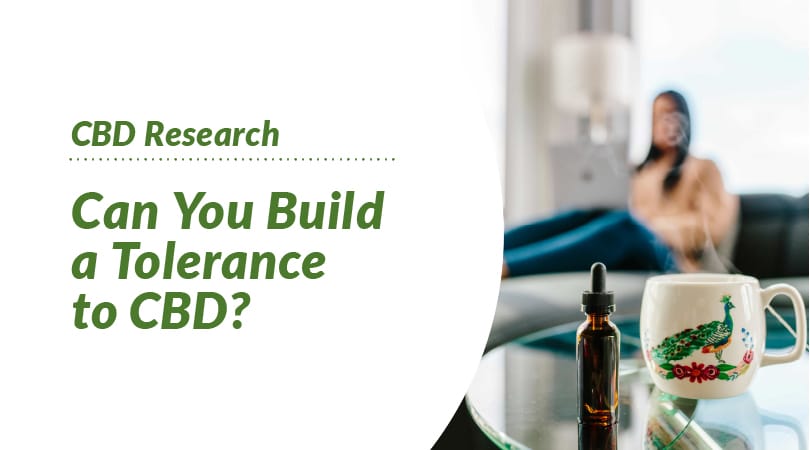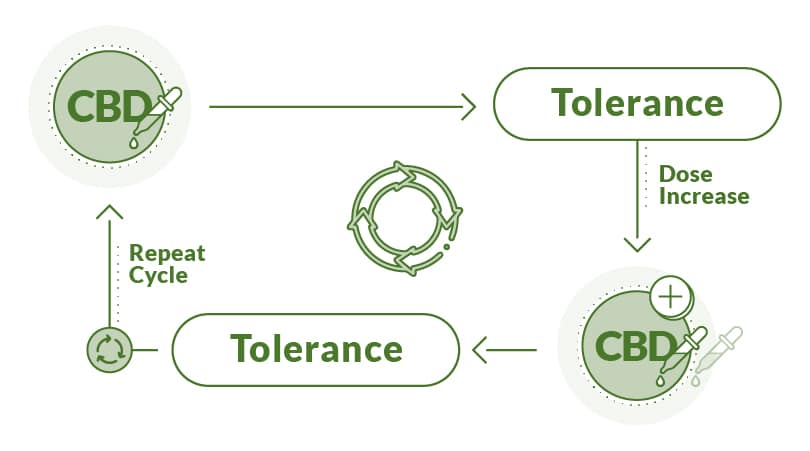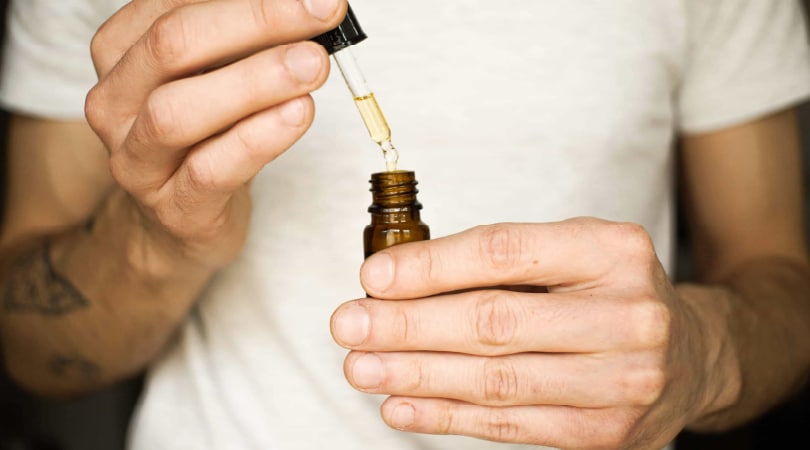
Can You Build a Tolerance to CBD? What Research Says
Every day, more and more people are incorporating CBD into their wellness routines. Some use it for its potential benefits in managing anxiety, sleep issues, and chronic pain, among many others. As it happens when you take any supplement regularly, you might be wondering: “Can you build a tolerance to CBD over time?”
In this article, we’ll delve into the science behind CBD tolerance, explore the concept of reverse tolerance, and provide insights to help you make informed decisions about your CBD usage.
Understanding Tolerance

Tolerance refers to the body’s reduced response to a substance after using it on a regular basis, often leading individuals to increase their dosage to achieve the same effects. This phenomenon is well-documented with substances like caffeine and medications.
There are three main types of tolerance:
- Pharmacodynamic tolerance: When your body’s receptors become less responsive or fewer in number, making the substance less effective over time.
- Metabolic tolerance: When your body starts breaking down the substance faster, so it doesn’t work as well as it used to.
- Behavioral tolerance: When you adjust your actions or habits in ways that reduce the noticeable effects of the substance.
How CBD Interacts with the Body
CBD (cannabidiol) interacts with the body’s endocannabinoid system (ECS), a complex network of receptors that regulate mood, pain, immune response, and more.
Unlike THC, which attaches directly to CB1 receptors, CBD works more gently by indirectly interacting with the endocannabinoid system. It also affects other important systems in the body—like those linked to mood (serotonin), pain (TRPV1), and sleep (adenosine)—which helps explain its many different effects and potential benefits.
What Current Research Says About CBD Tolerance
Although research on CBD tolerance is still in its early stages, some studies have helped give a bit more clarity on the subject :
- Chronic use of THC—the primary intoxicating compound in cannabis—has been shown to cause CB1 receptor downregulation, a key mechanism behind tolerance.
- CBD, by contrast, does not directly activate CB1 receptors. Instead, it may act as a negative allosteric modulator, meaning it can alter how CB1 responds to other cannabinoids without triggering it itself. This suggests that CBD may not cause the same receptor downregulation seen with THC.
- According to Harvard Health Publishing, CBD’s indirect interaction with the endocannabinoid system may be one reason why users are less likely to develop tolerance compared to traditional psychoactive cannabinoids.
The Concept of Reverse Tolerance
Some users report a phenomenon called reverse tolerance, where they actually need less CBD over time to feel the same effects.
This might happen because CBD can help boost the body’s own endocannabinoid system, encouraging it to make more natural cannabinoids and work more efficiently overall. Though mostly anecdotal at this stage, this concept is gaining interest as more people report greater effects from lower doses after prolonged use.
Factors Influencing CBD’s Effectiveness Over Time
There are several factors that may influence how CBD performs in the long run:
- Dosage: Taking too much too early can overwhelm receptors and limit response.
- Product quality: Always choose third-party tested CBD, as Vitality’s, to ensure potency and purity.
- Delivery method: CBD oils (or tinctures) are usually absorbed faster than capsules. On the other hand, CBD salves (or topicals) only work where you apply them.
- Individual physiology: Body weight, metabolism, and ECS sensitivity vary by person.

What to Do If CBD Seems Less Effective
If your CBD intake doesn’t give you the same results as it did before, here are a few tips:
- Adjust the dose: Sometimes, reducing the dose can enhance results.
- Take a break: A short tolerance break (3 to 7 days) may help reset your system.
- Re-evaluate product quality: Only buy from brands with transparent lab reports.
- Consult a healthcare provider: This is especially relevant if you’re taking medications or managing a medical condition.
Final Thoughts
Current research indicates that CBD is unlikely to cause traditional tolerance. In fact, for some, reverse tolerance may occur over time. Unlike THC, CBD works through a unique pathway that may support, rather than diminish, ECS function.
As with any wellness aid you take regularly, monitoring your usage, choosing high-quality products, and remaining flexible in your approach are key. Everyone’s body is different—what works for one may not work for another.
If you’re looking to refresh your CBD routine and want to ensure you’re taking a high-quality product, try our full-spectrum CBD oils at Vitality CBD.
FAQs
Can you become immune to CBD?
It is highly unlikely you can become immune to CBD. Studies show CBD doesn’t lead to classic tolerance like THC or opioids.
Why did CBD stop working for me?
If CBD stopped working for you, you may have adjusted your dose, or your body needs a break. Product quality and bioavailability can also play a role.
What is CBD reverse tolerance?
It’s when your body responds more effectively to CBD over time, potentially requiring lower doses.
How long should a CBD tolerance break last?
Most people benefit from a break of 3 to 7 days. Some opt for 1 or 2 weeks, depending on usage habits.
References
Grinspoon P. Cannabidiol (CBD): What we know and what we don’t. Harvard Health Publishing. 2024 Apr 4. Available from: https://www.health.harvard.edu/blog/cannabidiol-cbd-what-we-know-and-what-we-dont-2018082414476
Handelman K, Sumiya F. Tolerance to stimulant medication for attention deficit hyperactivity disorder: Literature review and case report. Brain Sci. 2022 Jul 22;12(8):959. doi: 10.3390/brainsci12080959. PMID: 35892400; PMCID: PMC9332474.
Evans SM, Griffiths RR. Caffeine tolerance and choice in humans. Psychopharmacology (Berl). 1992;108(1-2):51-59. doi: 10.1007/BF02245285. PMID: 1410146.
Hirvonen J, Goodwin RS, Li CT, Terry GE, Zoghbi SS, Morse C, Pike VW, Volkow ND, Huestis MA, Innis RB. Reversible and regionally selective downregulation of brain cannabinoid CB1 receptors in chronic daily cannabis smokers. Mol Psychiatry. 2012 Jun;17(6):642-9. doi: 10.1038/mp.2011.82. Epub 2011 Jul 12. PMID: 21747398; PMCID: PMC3223558.
Laprairie RB, Bagher AM, Kelly ME, Denovan-Wright EM. Cannabidiol is a negative allosteric modulator of the cannabinoid CB1 receptor. Br J Pharmacol. 2015 Oct;172(20):4790-805. doi: 10.1111/bph.13250. PMID: 26218440; PMCID: PMC4604171.
Grinspoon P. The endocannabinoid system: essential and mysterious. Harvard Health Publishing. 2021 Aug 11. Available from: https://www.health.harvard.edu/blog/the-endocannabinoid-system-essential-and-mysterious-202108112569
Henson JD, Vitetta L, Quezada M, Hall S. Enhancing endocannabinoid control of stress with cannabidiol. J Clin Med. 2021 Dec 14;10(24):5852. doi: 10.3390/jcm10245852. PMID: 34945148; PMCID: PMC8704602.
